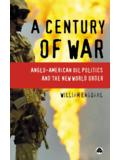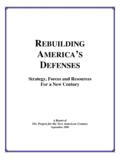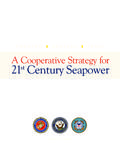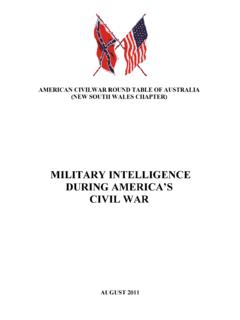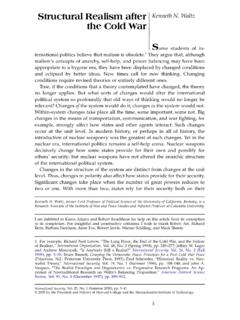Transcription of GLOBAL GOVERNANCE AND NATIONAL INTERESTS: …
1 459 GLOBAL GOVERNANCE AND NATIONAL INTERESTS: REGULATING TRANSNATIONAL SECURITYCORPORATIONS IN THE POST-COLD WAR ERAR egulating Transnational Security CorporationsKIM RICHARD NOSSAL*[Since the end of the Cold War, we have seen transnational security corporations ( TSCs ), orprivate armies, involved in an increasing number of conflicts. The rise of TSCs has led to calls tocontrol or regulate these companies. However, attempts to create a GLOBAL regulatory regime forprivate security firms have faced numerous obstacles. First, definitional problems have plaguedefforts to regulate the activities of these firms at both a NATIONAL and a GLOBAL level. Second, thedefinitional difficulties are exacerbated by the fact that so many governments have a deep andabiding interest in the continued, healthy existence of a corporatised industry devoted tooutsourcing and privatising many military functions.]
2 Finally, the most important obstacle to theeffective GLOBAL regulation of the transnational security industry is, ironically, the same factorthat prompted this industry to expand so much in the 1990s the GLOBAL market. I suggest thatthe privatisation of war became such a political issue over the course of the 1990s that whilethere may be an increased demand for the services of TSCs in the early 2000s, the demand forprivatised combat services during this period will diminish. This will have follow-on effects:there will be fewer TSCs delivering combat services and thus political demands for regulationwill diminish. In other words, the market may yet work its putative magic, making regulation ofTSCs by NATIONAL governments or international organisations unnecessary.]CONTENTSII ntroduction.
3 459 IIThe Rise of TSCs and the Push for Regulation ..461 IIIThe Difficulties of NATIONAL Regulatory Legislation ..464 AUnited Kingdom ..464 BAustralia ..465 CSouth Difficulties of International Conditions and Demand for Regulation ..472 VIConclusion ..475I INTRODUCTIONOne of the most striking features of the political landscape in the post-ColdWar era has been the rise of transnational security corporations ( TSCs ).1 Often *BA, MA, PhD (Toronto); Professor and Head, Department of Political Studies, Queen sUniversity at Kingston. Research for this article was supported by Social Sciences andHumanities Research Council of Canada grant 410 99 1498. My thanks to the anonymousreferees for their very helpful comments and is no agreement on an appropriate nomenclature for these firms.
4 While some prefer private military company , it is clear that some of these firms do not offer purely militaryservices, but all of them are in the business of providing security. For this reason, others use460 Melbourne Journal of International Law[Vol 2dismissed as corporate mercenaries or private armies , these firms havebecome increasingly active in conflict zones as varied as Sierra Leone, Angola,the Balkans, Colombia, the Democratic Republic of the Congo, Sudan and PapuaNew Guinea ( PNG ). While in some conflicts TSCs have helped their clientsachieve military success, the activities of some of these corporations, particularlythose which offer to supply clients with outsourced privatised combat services,have raised concerns in a number of quarters.]
5 Since the late 1990s, there havebeen an increasing number of calls to impose the same kind of control orregulation on TSCs that has been applied to individual mercenary those uneasy with the growing privatisation of warfare in the post-ColdWar era have been inclined to reach for regulatory instruments, attempts tocreate a GLOBAL regulatory regime for private security firms have been bedevilledby a number of obstacles. The purpose of this article is to explore theimpediments to the GLOBAL regulation of the transnational security , I will show that definitional problems have plagued efforts to regulatethe activities of these firms at both a NATIONAL and a GLOBAL level. Transnationalsecurity has proved to be an industry that is difficult to regulate preciselybecause it is so difficult to , I argue that the definitional difficulties are exacerbated by the factthat many governments have a deep and abiding interest in the continuedexistence of a healthy corporatised industry devoted to outsourcing andprivatising many military functions.
6 Not all of the governments in whose territoryTSCs are domiciled have an interest in regulating these firms, since they canoften use them to advance their own foreign policy interests. Likewise, eventhose countries in which TSCs are deployed do not always have an interest inglobal regulation of these firms. In particular, continued attachment to the ideals the term private security company , but this tends to be used to describe the industry thatprovides purely domestic security services. My own preference is transnational securitycorporation , a term which stresses the broader element of security and also the cross-borderoperations of these firms. There is a growing literature on the phenomenon of TSCs: see, eg,David Shearer, Private Armies and Military Intervention (1998); David Isenberg, Soldiersof Fortune, Ltd: A Profile of Today s Private Sector Corporate Mercenary Firms (1997)Center for Defense Information, Washington DC < > at 20 August 2001; Kim Nossal, Roland Goes Corporate: Mercenaries andTransnational Security Corporations in the Post-Cold War Era (1998) 1 Civil Wars 16;William Reno, Warlord Politics and African States (1998); Greg Mills and John Stremlau(eds), The Privatisation of Security in Africa (1999); Jakkie Cilliers and Peggy Mason (eds),Peace, Profit or Plunder?
7 The Privatisation of Security in War-Torn African Societies(1999); James Davis, Fortune s Warriors: Private Armies and the New World Order (2000).2 Advocates of regulation have included: Enrique Bernales Ballesteros, Special Rapporteur,UN Commission on Human Rights, Report on the Question of the Use of Mercenaries as aMeans of Violating Human Rights and Impeding the Exercise of the Right of Peoples toSelf-Determination, UN Doc (1996); GLOBAL Coalition for Africa,Democracy, the Military and Security in Africa Summary Report (1999)< #1299> at 20 August 2001; and from the London-based NGO International Alert, see Damian Lilly, The Privatization of Security andPeacebuilding: A Framework for Action (2000) < > at 20 August ]
8 Regulating Transnational Security Corporations461of NATIONAL sovereignty, especially in Africa, has helped to thwart efforts toregulate governments power to decide who they can or cannot engage to helpthem uphold the sovereign ideals of maintaining military control andmonopolising the use of force in their , I conclude that the most important obstacle to the effective globalregulation of the transnational security industry is, ironically, the same factor thatprompted this industry to expand so much in the 1990s the GLOBAL like Jeffrey Herbst argue that there will be an increased demand forprivate security services, particularly in Africa, because the industrialisedcountries of the West have made a conscious and strategic decision to remaindisengaged from African In Herbst s view, high market demand willensure the continuation, if not the expansion, of the supply of such services.
9 Inthat event, the problems of definition and NATIONAL sovereignty will again assertthemselves, making regulation do not disagree with Herbst s argument that there is a close connectionbetween market conditions and the GLOBAL regulation of the transnational securityindustry. However, TSCs differ considerably in the security services theyprovide: only a tiny minority supply the combat services that generated so muchopposition, and calls for regulation, in the 1990s. I will argue that private combatservices pose such a political problem that while the demand for the services ofTSCs in general may increase, the demand for privatised combat will continue todiminish. This will have follow-on effects: there will be fewer TSCs actuallydelivering combat services and, without that visibility, political demands forregulation will diminish.
10 In short, the market may yet work its putative magic,making regulation of TSCs by NATIONAL governments or internationalorganisations THE RISE OF TSCS AND THE PUSH FOR REGULATIONThe rise of TSCs in the post-Cold War era has been well documented anddoes not need to be rehearsed However, it is important to note thatalthough the transnational security industry has a number of common elements,the growing number of firms that offer security services on the GLOBAL market arein fact highly is true that all these firms have a number of common elements. All haveessentially corporate structures and purposes they are about as open abouttheir business as other firms in the marketplace (in other words, not very); theyare all guided by standard business practices and norms; and they all seek profitmaximisation.
